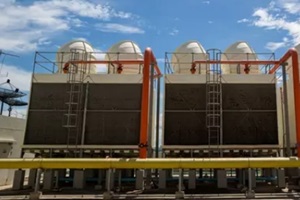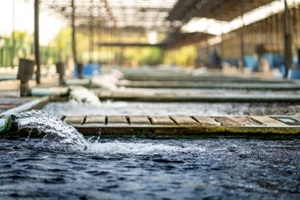 With the summer heating up, building owners and facility managers have the important task of keeping their cooling towers running at peak efficiency. These towers are key components in cooling systems and often run around the clock, as they are essential for maintaining a comfortable indoor environment.
With the summer heating up, building owners and facility managers have the important task of keeping their cooling towers running at peak efficiency. These towers are key components in cooling systems and often run around the clock, as they are essential for maintaining a comfortable indoor environment.
However, the warm weather also creates a perfect breeding ground for Legionella bacteria, which can cause serious health issues for your building’s occupants and visitors. Legionella bacteria tend to thrive in warm, water-based systems, making cooling towers particularly vulnerable to outbreaks.
The combination of warm water and constant operation creates a perfect storm for bacterial growth. In poorly maintained systems, stagnant water becomes a haven for these pathogens, setting the stage for potential outbreaks and costly consequences.
The Growing Risk and Consequences of Legionella
The implications of Legionella growth in cooling systems extend far beyond discomfort for occupants. It is important to understand the serious health and potential legal or media ramifications that can result from inadequate prevention measures.
What Is The Immediate Risk For Those Responsible?
When Legionella-contaminated water becomes airborne, it can lead to severe respiratory illnesses, including the potentially fatal Legionnaires’ disease. The risk is particularly high in densely populated areas served by these cooling systems, where a single outbreak can affect numerous individuals.
Beyond the immediate health concerns, facility managers can face potential legal repercussions if proper prevention measures aren’t in place. In recent years, many government agencies have increased regulatory focus on Legionella prevention in cooling towers.
New York City, in particular, has implemented some of the strictest regulations in the country, requiring building owners to register cooling towers, conduct regular inspections, and maintain detailed records of water management plans. New Jersey and other surrounding areas have also strengthened their guidelines, emphasizing the importance of proactive Legionella control measures in public and private buildings.
A Legionella outbreak in a commercial building can also trigger a media firestorm, causing severe reputational damage and potentially leading to long-term financial repercussions for owners and managers.
Negative publicity for residential buildings for example can result in tenants leaving or missing out on potential future renters, reduced investor confidence, and create a lasting stigma that may take years and significant resources to overcome.
Comprehensive Legionella Prevention Strategies
Addressing the Legionella threat requires a multi-faceted approach that combines proactive planning, advanced technologies, and expert knowledge. This section outlines key strategies for effective prevention and control.
Implementing a Robust Water Management Plan
 The key first step of Legionella prevention is a well-defined water management plan. This comprehensive strategy outlines specific procedures for maintaining water quality, including regular testing protocols.
The key first step of Legionella prevention is a well-defined water management plan. This comprehensive strategy outlines specific procedures for maintaining water quality, including regular testing protocols.
By systematically monitoring various points within the cooling system, facility managers can ensure thorough coverage and quickly identify potential issues before they escalate. An effective plan should be tailored to the specific needs of each facility, taking into account factors such as system design, water source, and usage patterns.
Cleaning and Maintenance Techniques
Effective Legionella prevention requires a multi-faceted approach to cleaning and maintenance. Regular physical scrubbing of tower components is crucial for removing biofilm and scale buildup that can harbor bacteria.
This mechanical cleaning should be complemented by appropriate chemical treatments, utilizing biocides and water treatment chemicals to control bacterial growth and maintain optimal water chemistry.
Systematic inspections for wear and tear can prevent water stagnation and system compromises that contribute to bacterial growth. These maintenance practices should be performed regularly and documented thoroughly to ensure consistent system health.
Leveraging Modern Monitoring Systems
Modern monitoring technologies offer a powerful tool in the fight against Legionella. Advanced systems provide real-time insights into water quality and system performance, tracking critical parameters such as water temperature, pH levels, and biocide concentrations.
This continuous monitoring allows for precise control over the cooling tower environment, enabling facility managers to make informed decisions and respond swiftly to any changes that could indicate bacterial growth. Real-time data and automated alerts help maintain optimal operating conditions, ensuring that water temperature and chemical levels remain within safe parameters.
The Importance of Professional Expertise
While in-house maintenance is still necessary, partnering with water treatment experts can significantly enhance Legionella prevention efforts. Professional services offer specialized knowledge, providing access to the latest prevention techniques and technologies.
These experts can develop customized solutions that address the unique needs of each cooling system, ensuring that prevention strategies are both effective and efficient. Moreover, professional guidance is invaluable in navigating the complex landscape of regulatory compliance, helping facility managers ensure that their practices meet or exceed current standards.
Taking Action: Your Next Steps in Legionella Prevention
 Effective Legionella prevention is crucial for maintaining safe and efficient cooling systems, especially during the summer months. By implementing comprehensive water management plans, utilizing advanced monitoring technologies, and partnering with water treatment experts, building owners and facility managers can significantly reduce the risk of outbreaks and ensure regulatory compliance.
Effective Legionella prevention is crucial for maintaining safe and efficient cooling systems, especially during the summer months. By implementing comprehensive water management plans, utilizing advanced monitoring technologies, and partnering with water treatment experts, building owners and facility managers can significantly reduce the risk of outbreaks and ensure regulatory compliance.
Proactive measures not only protect the health of occupants but also safeguard property reputations and mitigate potential legal and financial risks associated with Legionella incidents. Don’t let Legionella threaten the safety of your building occupants or the reputation of your property this summer. Take proactive steps to protect your cooling systems and ensure compliance with current regulations.
Tower Water’s team of experts is ready to help you develop and implement a comprehensive Legionella prevention strategy tailored to your facility’s unique needs. Contact Tower Water today to schedule a consultation and discover how we can help keep your cooling systems running safely and efficiently all year round.
